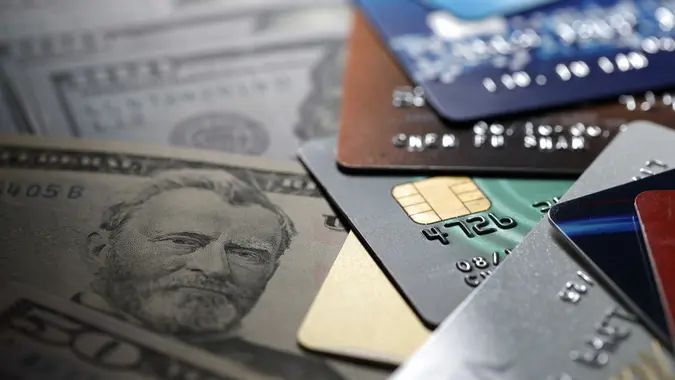How To Increase Your Credit Limit and Improve Your Credit Score

Commitment to Our Readers
GOBankingRates' editorial team is committed to bringing you unbiased reviews and information. We use data-driven methodologies to evaluate financial products and services - our reviews and ratings are not influenced by advertisers. You can read more about our editorial guidelines and our products and services review methodology.

20 Years
Helping You Live Richer

Reviewed
by Experts

Trusted by
Millions of Readers
You’ve just been approved for a new credit card — congratulations! There’s only one problem: Your credit limit is a fraction of what you’d like. Here’s what you should know.
What Does It Mean To Increase Your Credit Limit?
An increase on your credit limit means that you have a little more money to borrow on your credit line from your bank, credit card or lender. Credit limit is the amount of money you can borrow.
Sometimes a lender will automatically extend more credit after you’ve established good credit habits.
Your credit limit is usually assigned immediately after your account is approved. You can always ask for an increase later.
Why You Might Want To Increase Your Credit Limit
There’s very little downside to increasing your credit limit. Access to more credit can:
- Give you more flexibility during emergencies.
- Make big purchases easier to manage
- Lower your credit utilization ratio, which is a huge factor in determining your credit score.
What’s an Ideal Credit Utilization Ratio?
Experts recommend that you keep your amounts owned below 30%.
When Is the Right Time To Ask for a Credit Limit Increase?
You don’t want to ask for a credit limit increase soon after you’ve opened your credit card. The bank has already examined your credit profile and offered enough borrowing power that matched your income and credit history with their ability to take on risk.
If something has improved in your life — for example, you’ve paid all your bills on time, you got a raise or a higher-paying job — and your credit score sees a boost, a bank might happily bump up your credit limit.
It’s wise to wait a few months between your credit limit increase requests. By doing this, you give yourself a better opportunity to show that your financial position has improved and you’ve been more responsible with your cash flow.
How To Ask for a Credit Limit Increase
Credit card issuers offer many ways to request a credit limit increase.
- Phone: You can always call the number on the back of your card to talk to customer service.
- Online: In some cases, you can initiate a request via the bank’s website or app.
Be ready to share your personal information, including:
- Current income
- Employment status
- Monthly housing cost
- Desired limit increase
Being polite always wins the day. Keep your request simple and generally be cheery and friendly. It goes a long way!
Tips To Improve Your Chances of Getting Approved
You’ve got to show the bank or lender that you have healthy credit habits if you want to improve your chances of increasing your credit limit. What you can do:
- Pay bills on time
- Keep balances low — less than 30%
- Keep your income information up-to-date with the lender
- Don’t open too many cards all at once.
Use Your Card Regularly
If you’re not using the card regularly, the bank might not see a reason to increase your spending power. Here’s what you can do:
- Pay everything with your credit card.
- Use it toward your everyday spending.
- Keep up with the payments so that you don’t miss or make a late payment.
- The issuer will see you’ve been spending consistently, which helps with your request.
What Happens if Your Request Gets Denied?
It’s quite common to see requests get denied. It doesn’t mean your credit profile is subpar or that you’ve failed in some way, though.
You can call the bank to see why you request was denied. You may likely receive a letter explaining the denial, as well. Wait a few months before you try again and work on improving whatever the bank cited as the reason for rejection. No sweat!
Credit Limit Increases: Hard Pull vs. Soft Pull
Issuers often pull your credit when deciding whether or not to award you with a credit limit increase. The type of credit pull you get will depend on the situation:
- Hard pull: A hard pull appears on your credit report and will temporarily lower your credit score a little.
- Soft pull: A soft pull does not appear on your credit report and doesn’t affect your score.
It’s worth asking the bank if it will pull a hard or soft inquiry. If the issuer automatically increases your credit limit — without you asking — it’ll be a soft pull. If you formally request the increase, it could be either.
Can Increasing Your Credit Limit Hurt Your Credit?
Increasing your credit limit won’t itself hurt your credit. In fact, it can help to improve your credit score as it may improve your credit utilization ratio.
That said, access to more credit can be dangerous if you’ve got a problem dealing with credit. Higher limits can tempt you into overspending, which will lead to a low credit score, high interest fees for carrying a balance month-to-month, and more.
You should only ask for an increase if you can manage your credit responsibly.
Final Take: Should You Ask for a Credit Limit Increase?
You should periodically ask for a credit limit increase on the credit cards you use the most. It can ultimately improve the health of your credit when you wield it responsibly.
Be sure to time your request wisely after you’ve improved your credit score or received a raise, for example to give the banks motivation to trust you with more money.
How To Increase Your Credit Limit FAQ
Here are the answers to some of the most frequently asked questions about increasing your credit limit.- How much of an increase should I ask for?
- If you're looking to increase your credit limit, ask for however much the bank is willing to give you. Anything is helpful. If the bank doesn't want to extend as much credit as you ask for, it can come back with a counteroffer.
- How often can I request a credit limit increase?
- You should wait a few months between your credit limit increase requests. Banks want a reason to increase your credit line. For example, you've received a raise, your credit score has increased, etc.
- Can I get a credit limit increase with bad credit?
- Getting a credit limit increase with bad credit can be challenging because banks examine your credit profile similar to when you apply for new credit. They'll be hesitant to trust you with more credit if you've previously exhibited bad behavior.
- Does increasing my limit increase my monthly payment?
- No, increasing your credit limit won't increase your monthly payment -- unless your balance is higher than the limit than before the increase.
Our in-house research team and on-site financial experts work together to create content that’s accurate, impartial, and up to date. We fact-check every single statistic, quote and fact using trusted primary resources to make sure the information we provide is correct. You can learn more about GOBankingRates’ processes and standards in our editorial policy.
- Equifax. "Credit Limit Increases: What to Know."
- Equifax. "What Is a Credit Utilization Ratio?"
 Written by
Written by  Edited by
Edited by 

























